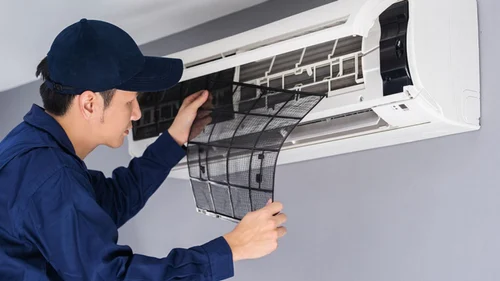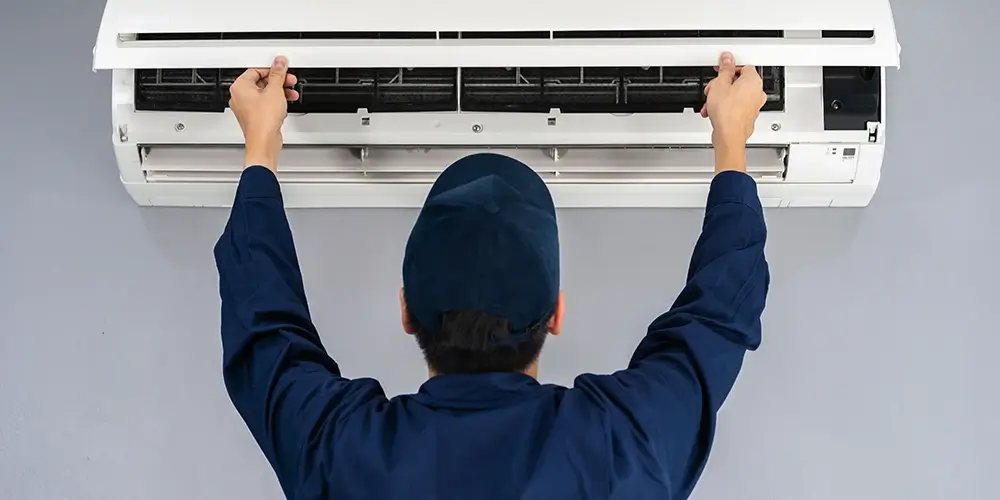Air Conditioning Repair Near Me - An Overview
Air Conditioning Repair Near Me - An Overview
Blog Article
Not known Facts About Air Conditioning Repair Near Me
Fix Air Conditioner: Expert Cooling System Remediation Ensures Your Home Stays Comfy All Year Round
Kinds Of AC Systems
When dealing with AC repair, understanding the kind of air conditioning system you're dealing with can conserve time, money, and aggravation. Ever wondered why some systems cool a space quicker than others? Or why particular systems appear to break down more regularly? Let's peel back the layers.
Central Air
A Biased View of Fix Air Conditioner
Envision a cool breeze flowing through a whole house, whispering convenience into every corner. Central air conditioning systems do precisely that. They use a network of ducts to distribute cooled air, counting on a compressor and condenser outside, coupled with an evaporator get more info coil inside. When this complex beast falters, pinpointing the problem can be like discovering a needle in a haystack.
Split Systems

Split systems are a popular option for many homes-- part indoor system, part outdoor compressor. They offer flexibility and performance, however their double nature suggests repair can involve either element. Have you ever heard a weird noise outside your home only to find the indoor unit isn't cooling? That's a classic indication of a split system glitch.
Not known Facts About Ac Air Conditioner Repair
Window Units
These compact warriors fight summertime heat by fitting snugly into a window frame. They integrate all parts into a single box. Their simplicity often implies fewer repair headaches, but neglecting filters or enabling debris buildup can result in diminished performance or breakdowns.
Ductless Mini-Splits
The 5-Minute Rule for Ac Fixing
Ductless systems bypass ductwork completely, making them ideal for homes without existing ventilation. They're peaceful, effective, and remarkably durable. When repair work are needed, service technicians must be proficient at handling refrigerant lines and electrical connections-- no small accomplishment.
Quick Referral Table
| Type | Secret Features | Typical Repair Issues |
|---|---|---|
| Central air conditioning | Ductwork, whole-house cooling | Duct leakages, compressor failure |
| Split System | Indoor & & outside systems | Refrigerant leakages, fan motor concerns |
| Window System | All-in-one, simple installation | Filthy filters, electrical faults |
| Ductless Mini-Split | No ducts, zoned cooling | Line leaks, sensing unit breakdowns |
Indicators on Ac Fixing You Should Know
Unraveling one of the most Frequent Air Conditioner Problems
Have you ever questioned why your ac system suddenly stops cooling during a sweltering afternoon? One common culprit is an unclean or clogged air filter. This tricky villain limits airflow, forcing your system to work overtime, which not just minimizes performance but can likewise lead to premature breakdowns. Picture attempting to breathe through a scarf soaked in dust-- it's exhausting!
Another frequent misstep is refrigerant leakages. These unnoticeable leaks don't simply decrease cooling power however can likewise damage the compressor, the heart of your a/c unit. How frequently do you inspect for unusual hissing noises or ice development on the coils? Capturing these indications early can conserve you from costly repairs down the line.
Beyond the Essentials: Lesser-Known Issues
Some Ideas on Air Conditioner Repair Near Me You Need To Know
Often, the thermostat itself is the nuisance. Miscalibrated or defective thermostats send out combined signals, triggering the air conditioning to cycle unpredictably. Ever skilled your AC turning on and off in quick succession? That's called brief biking, a sly performance drainer that can use out parts faster than you 'd anticipate.
Electrical issues, such as worn electrical wiring or a malfunctioning capacitor, might lurk below the surface area. AC Repair Near Me. These typically manifest as air conditioning systems stopping working to begin or unexpectedly closing down. An expert eye knows to evaluate these components with accuracy tools, something a casual glimpse will not reveal
Expert Tips for Diagnosing Common Air Conditioning Concerns
Some Known Details About Repair Air Conditioner Near Me
- Examine and change air filters regularly-- every 1 to 3 months depending upon usage and environment.
- Listen for unusual sounds like rattling or buzzing that might signal loose parts or electrical faults.
- Check the outdoor system for particles or obstructions that impede airflow and cause getting too hot.
- Look for frost buildup on evaporator coils, a hint towards refrigerant problems or airflow constraints.
- Check the thermostat settings and recalibrate if the temperature readings feel off.
Quick Recommendation Table: Symptoms & & Probable Causes

| Sign | Probable Cause | Expert Suggestion |
|---|---|---|
| Warm air blowing | Low refrigerant or dirty coils | Tidy coils and inspect for leaks instantly |
| Short biking | Thermostat concerns or oversized unit | Adjust thermostat settings and consult sizing standards |
| System will not start | Electrical faults or capacitor failure | Test wiring and replace capacitors as required |
| Water leakage | Clogged drain line or frozen evaporator | Clear drain lines and check for coil icing |
DO IT YOURSELF AC Maintenance Tips
An Unbiased View of Air Conditioner Repair Near Me
Ever noticed your air conditioning unit sputtering like an old engine on a hot summer season day? Overlooking subtle indications often indicates more than simply a sweaty afternoon-- it's a start to unexpected air conditioner repair work expenses. What if you could capture those whispers before they turn into wails? Routine DIY maintenance can be your very first line of defense.
Easy Steps to Keep Your AC Running Smoothly
Unknown Facts About Ac Fixing
- Tidy or Change Filters: A clogged up filter resembles attempting to breathe through a headscarf. Every 1-3 months, examine and switch out your filters. It enhances airflow and efficiency, preventing compressor strain.
- Examine the Condenser Coils: Dust and particles function as invisible blankets smothering your system's cooling power. Gently brush or vacuum the coils, but prevent severe chemicals that may deteriorate the metal.
- Check the Drain Line: When was the last time you glanced at your drain pan? A blocked drain can cause water leakages and foster mold development. Flushing it with a vinegar service month-to-month keeps the circulation clear.
- Seal and Insulate: Are your ductworks whispering leaks? Sealing gaps with mastic or foil tape boosts efficiency and minimize uneven cooling.
Pro Tips Beyond the Essentials
- Measure your unit's voltage to capture subtle electrical wear before it triggers big issues.
- Listen for uncommon hums or rattles-- these acoustic breadcrumbs frequently signal loose parts or stopping working motors.
- Keep outdoor systems shaded however make sure at least 2 feet of clearance around them for ideal airflow.
Ask yourself: Are you hearing your a/c's peaceful SOS or just waiting for it to yell? Requiring time for DIY air conditioning maintenance transforms reactive repair into proactive care, saving sweat, stress, and yes, cash.
Unknown Facts About Air Conditioning Repair Near Me
Why Competence in A/c Repair Work Matters
Envision this: your a/c system sputters and groans throughout a scorching afternoon, leaving you sweltering indoors. Would you rely on a novice fumbling with delicate components, or would you look for the reassurance of a professional air conditioner professional!.?.!? The complexities of modern a/c systems demand precision and experience. A minor mistake can intensify a small malfunction into an expensive catastrophe.
A Biased View of Air Conditioning Repair
Hidden Complexities Behind the Cool Breeze
Numerous ignore the layers concealed below the sleek exterior of an air conditioner unit - Repair Air Conditioner Near Me. From refrigerant leaks that calmly drain performance to malfunctioning thermostats that misread temperature levels, these problems require more than a fundamental toolkit. Specialists have an eager eye for detecting problems that balance house owners overlook
Vital Tips for Selecting the Right Specialist
Not known Details About Ac Repair
- Accreditation and Training: Verify qualifications; a service technician trained in the current HVAC innovations is invaluable.
- Experience with Specific Systems: Not all AC systems are developed equivalent; find somebody knowledgeable about your design's peculiarities.
- Diagnostic Technique: Competent professionals utilize sophisticated tools-- like electronic leak detectors and thermal imaging-- to identify surprise faults.
What to Anticipate from a Pro's Diagnostic Process
| Action | Purpose | Specialist Insight |
|---|---|---|
| Visual Assessment | Identify obvious wear or damage | Try to find corrosion or unusual sounds-- a telltale indication often overlooked |
| Pressure Evaluating | Spot refrigerant leaks | Subtle pressure drops can mean micro leaks undetectable to the naked eye |
| Electrical Evaluating | Guarantee circuit integrity | Loose connections can imitate severe mechanical failures |
The smart Trick of Air Conditioning Repair Near Me That Nobody is Talking About
Why Do It Yourself Frequently Falls Short
Appealing as it is to play with your AC system, DIY repairs regularly miss the root cause. For instance, complementing refrigerant might briefly cool your space however ignores leakages that worsen over time. Professional service technicians don't simply patch symptoms; they hound the underlying mechanical and electrical faults that sap efficiency.
Some Known Questions About Ac Fixing.
Questions to Ask Before Employing
- What diagnostic tools do you use to identify concerns?
- Can you describe the repair procedure and anticipated results?
- Are you acquainted with the refrigerants suitable with my system?
- Do you follow safety protocols for managing electrical elements?